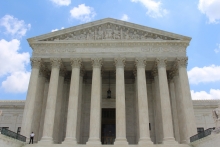"After almost a hundred years, the Equal Rights Amendment, originally written by Penn alumna Alice Paul and Crystal Eastman following the success of the suffrage movement, may finally be ratified as an amendment to the United States Constitution, guaranteeing equal legal rights for all American citizens regardless of sex. Virginia would be the 38th state to approve the amendment and is in position to do so, with a Democratic majority and a 1971 state constitution that prohibits discrimination on the basis of sex. What this proposed amendment means—and whether or not it can still be ratified—is up for debate.
The Equal Rights Amendment itself is simple, with the main clause stating, “Equality of rights under the law shall not be denied or abridged by the United States or by any State on account of sex.” First introduced to Congress in 1923, the ERA has a long and beleaguered history.
Although the Amendment was defeated 38-35 in the U.S. Senate in 1946, the idea of having an equal rights amendment began to gain momentum during the progressive social movements of the 1960s, most notably the Civil Rights Act of 1964. U.S. Rep. Martha Griffithsreintroduced the proposed amendment in Congress in 1971, bringing the ERA back to the forefront. It was approved by the House of Representatives in 1971, the Senate in 1972, and 35 of the necessary 38 states by 1977.
Then support stalled in part by an effective anti-amendment campaign, notably led by the conservative crusader Phyllis Schlafly. Congress voted to extend the ratification deadline from 1979 to 1982. No additional states ratified the amendment during this period, while Idaho, Kentucky, Nebraska, Tennessee, and South Dakota revoked their ratifications.
Following the advent of fourth-wave feminism and the #MeToo movement, Nevada ratified the ERA in 2017, followed by Illinois in 2018. Virginia’s political leaders intend to put the ratification to vote in 2020. Three Penn experts discuss the feasibility and impact of the ratification: Kathleen M. Brown and Maria Murphy of the Alice Paul Center for Research on Gender, Sexuality, and Women, as well as legal historian Mary Frances Berry. The Center is named for Paul who received a Ph.D. from the University of Pennsylvania in 1912 and joined the National American Women’s Studies Association during her time here, beginning her activist work."
To read the full conversation please check out the article on Penn Today.

 The Program in Gender, Sexuality, and Women’s Studies
The Program in Gender, Sexuality, and Women’s Studies
